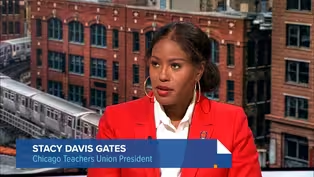Chicago Tonight: Black Voices
Black Women More Likely to Die From Pregnancy-Related Complications
Clip: 4/16/2025 | 8m 20sVideo has Closed Captions
A recent study by the Illinois Department of Public Health examined maternal mortality rates.
As part of the sweeping layoffs orchestrated by the Department of Health and Human Services, the department tasked with monitoring and improving maternal and child health at the Centers for Disease Control and Prevention was placed on leave. Others researching maternal mortality had their funding rescinded, leaving health experts in limbo.
Problems playing video? | Closed Captioning Feedback
Problems playing video? | Closed Captioning Feedback
Chicago Tonight: Black Voices is a local public television program presented by WTTW
Chicago Tonight: Black Voices
Black Women More Likely to Die From Pregnancy-Related Complications
Clip: 4/16/2025 | 8m 20sVideo has Closed Captions
As part of the sweeping layoffs orchestrated by the Department of Health and Human Services, the department tasked with monitoring and improving maternal and child health at the Centers for Disease Control and Prevention was placed on leave. Others researching maternal mortality had their funding rescinded, leaving health experts in limbo.
Problems playing video? | Closed Captioning Feedback
How to Watch Chicago Tonight: Black Voices
Chicago Tonight: Black Voices is available to stream on pbs.org and the free PBS App, available on iPhone, Apple TV, Android TV, Android smartphones, Amazon Fire TV, Amazon Fire Tablet, Roku, Samsung Smart TV, and Vizio.
Providing Support for PBS.org
Learn Moreabout PBS online sponsorship>> New research shows the rate of women dying from pregnancy-related.
Medical conditions has only worsened in recent years and the disparity that black women are 3 times as likely to die of such an illness as white women is no better.
This comes at a time when the very agencies charged with reducing these deaths is facing cuts from the Trump administration.
Joining us now with more our Denise Banton director of Rush University Medical Center, labor delivery and postpartum units Jameka Sampson, senior director of community Health and equity for Planned Parenthood of Illinois and Tony Taylor, co-founder of Chicago Birth Works Collective thanks to all 3 of you for joining us.
So Denise, want to start with you because in this recent study that was published in the Journal of the American Medical Association shows the rate of maternal mortality not only increased by 27.7% from 2018 to 2022, but that the racial disparities also widened black women having the second highest rate at 2.8 times higher than white women.
They are second to Native American women.
With all the we have learned about maternal mortality in this country in recent years.
What do you make of these new numbers?
>> I believe this is highly really to co-morbidities access to care, addressing women's concerns.
The the thought that people can be dismissed.
It's not acceptable.
We know our bodies.
We know what we're feeling.
We know what we're thinking and what are what are signs of symptoms are what doesn't feel right.
And trust of our health care providers, our healthcare providers to really acknowledge what women are saying.
What do you think more hasn't been done because we had we've had these these conversations in the last several years.
What do you think we have or have we just not moved quickly enough?
>> I just think we have moved quickly enough.
I think we've scratched the surface.
There's so many layers to this whole issue.
>> And I believe that we need to spend more time.
The real number one focus is shared decision-making with our patients in a hospital setting because I'm from a hospital setting talking about what are the expectations and unbiased information about care.
>> Tony, what would you say are some of the health challenge is that pregnant people face during and after the pregnancy?
Lack of support with their family, lack of support and medical team.
>> And not understanding fully what they need during the pregnancy, not fully understanding what is what resources are available to them after they deliver.
Not planning to have mental mental health after care.
Oftentimes when moms as they make sure you get an appointment with a mental.
>> look, I have it there because I'm like that's not that they're that I'm talking about.
It's a completely different.
There And the care that you need for pregnancy is completely different from any other care.
And if you can't identify the gaps in your needs, you just kind fall in the cracks.
And so sometimes it's a matter of of women not knowing what they don't know.
It sounds like you're the Organizations association.
The recommendation also change, though, in the last several years that women should be seeing their providers sooner than the 6 weeks post Partum that it had been before.
But it seems like even that.
>> Hasn't solved our problems.
>> You know, it has it.
They.
A lot the doctors that I talked to had given some talks to a couple be residents and they just they don't have the time.
That they only have a certain amount of time and it and I'm like if you're not making a connection with the patient.
They're not feeling seeing they're not filling heard.
They're less likely to less likely to return to the appointment or follow up for the next appointment and that those gaps in care equal.
Missing parts of your medical file, missing parts of identifying problems that you're having soon enough that they can remedy them before.
It's an actual issue and delivery Jamaica, specifically in Chicago.
Tell us about how where a patient resides in the city can contribute to their maternal health.
we're seeing we've seen on the southwest side that there are more mature.
Several hospitals have closed maternity units.
>> So where you live determines your access to care and for you have travel.
The more stress you experience as a birthing person as a mom.
So Planned Parenthood of Illinois started the bridges to care program that connects people who decide to parent with care providers like rash.
And we have also began partnering with the deal.
deal is Chicago, collective to make sure that birthing people and moms have the support they need to have healthy and help happy pregnancies.
What services and resources do do you think that we need to see what more do we need to see on the south and West sides to help to close that gap I another several folks working on having birthing units on stand-alone you or a physician availability We were just had a baby shower and community baby shower and somebody stated they had a long wait to get care to to see being.
That's what Bridges hopes to support is be giving people the prenatal care until they can get into the point with there.
Obstetrician.
even fresh food and access to fresh food and care we need on the south and west sides.
Tony, what do you think?
It's crucial to include cultural, competency and even birth justice principles doula training.
>> If you don't understand the community you're serving year.
You're not gonna make a connection.
You're not gonna make a difference.
And the way that you can, it's almost as if there are a number and you're checking a box.
You have to meet people where they are and you have to figure out what they're not saying.
make them comfortable to share the things that they're not say identifying the things that you're seeing, that they're not and get them to talk about Even if you don't get them to talk about it because some some don't want to necessarily talk about it.
But just >> if I witnessed something has to do lower just in communication with someone I just share resources and just allow you to make the decision.
Because I don't want to put you on the spot.
You historically black woman, we don't we don't have good trust issues.
Medical?
Yeah.
And that's not instead of Dylan Isin us for that.
Which it's founded in truth that to need to hold themselves accountable for the trauma that's happening to us.
But if if we have to have more resources and just things made available to us without peer pressure of you got to do this in school days.
Denise, according to the American Heart Association, Black Women are 58% more likely to have high blood pressure because you mentioned comorbidities or compared to 43% of white women.
>> They often more they're more likely to develop fibroids as well or providers doing enough to look out for these potential complications?
Are they trained to, you know, to look out for those in and how those might impact maternal health have a boost.
Definitely the they are trained.
They have the resources and the have the knowledge.
>> To manage those.
It's just going back to what was just said.
How are you connecting with the patient to get the information that you need and the to utilizing each think of that.
Bt you can some communities.
The comment sugar.
What does that mean?
So you have to you have to sort of culturally competent and understand the language of this of the patients that you're serving.
And yes, think health care providers have the information.
We have the information we just need to utilize the screening tools and ultimately provide resources to patients.
Okay.
That's where we'll have to leave it Thanks for the work
Chicago City Council Blocks Jan. 6 Rioters From City Jobs
Video has Closed Captions
Clip: 4/16/2025 | 2m 53s | “Traitors to this country should not be allowed to work for the city,” Ald. Maria Hadden said. (2m 53s)
CTU President Stacy Davis Gates on New Contract
Video has Closed Captions
Clip: 4/16/2025 | 8m 31s | After nearly a year of bargaining, the CTU is one step closer to finalizing a deal with CPS. (8m 31s)
Providing Support for PBS.org
Learn Moreabout PBS online sponsorship
- News and Public Affairs

Top journalists deliver compelling original analysis of the hour's headlines.

- News and Public Affairs

FRONTLINE is investigative journalism that questions, explains and changes our world.












Support for PBS provided by:
Chicago Tonight: Black Voices is a local public television program presented by WTTW

